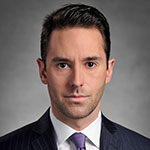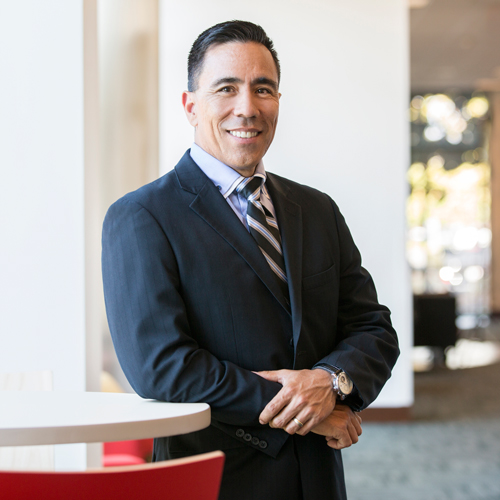“I was born and grew up in south Chicago and attended Bowen High School—which is where my interest in engineering began. I earned a bachelor’s degree in electrical engineering from the Illinois Institute of Technology. While I was in school, I was lucky to get an internship at ComEd. I did that for three summers before starting my career here.
One of my strengths is my breadth of experience at this company. I started in engineering and over the last thirty-four years had assignments in HR, did an IT project—before it was even called IT—worked on the financial side, on the customer side, in operations, and I’m now on the government side and in public affairs. So, I have a broad understanding of the business.
My current title is senior vice president legislative & external affairs and chief governmental affairs & community relations Officer. My responsibilities include developing and nurturing relationships with ComEd’s key stakeholders. I also serve as the face of ComEd in emergency/crisis situations such as the recent tornadoes in northern Illinois. One of my most valuable skills is the ability to explain complex subjects like the electric industry in terms that lay people can understand.
Economic development is one of my areas of responsibility. We have been working with economic development councils and other groups and have been able to attract more than 60 data centers/server farms to the Chicagoland area. We leveraged a variety of resources such as generally lower energy prices than in other cities and availability of water for cooling the servers to attract this business. Bringing business to northern Illinois is good for the economy and ComEd.
My team includes 135 people—from senior lobbyists in Springfield to external affairs managers in the community to account representatives to the corporate relations group. I would say my leadership style is situational. People, circumstances, and conditions vary, and you need to take everything into consideration to determine the best approach. My leadership approach has evolved over the years. My first leadership job was very task-oriented, very technical. So, it was about getting things done.
My assignments now are broader. So a lot of my time is spent strategically, setting long-term goals and attracting and developing talent—moving the organization forward.
A lot of economic factors and trends impact our business. In the economic downturn of 2008, growth came to a halt in the United States, and Chicago wasn’t spared. Businesses cut back on production, which had a direct impact on ComEd.
“We want to remain a critical part of the economy and community for years to come.”
Other things that impact our business: the speed at which technology is evolving. And customers want renewable sources of energy, local sources of energy—like rooftop solar panels or small wind turbines—or fuel cells for commercial customers. That is challenging and changing the way the electric grid has been operating for the last 120 years. Until now, large central power plants generated electricity and sent it where customers needed it: to a business, factory, or residence. Now, sources of power may be on someone’s rooftop or in their backyard. Energy is flowing to consumers—but also sometimes from consumers back to the grid. We have to complete these transactions from a financial perspective—as well as operate the grid.
People who install solar panels can bypass the grid to some extent. But there are cloudy days and nighttime, so people can’t totally disconnect from the grid. The problem is that people who can’t afford to install solar panels—or who live in condos or apartments—are subsidizing the grid costs for the people who have solar panels. We’ve introduced legislation to address that issue. Our goal is for everyone to pay their fair share for the grid.
Another factor affecting ComEd is climate change, which has made the weather more violent and unpredictable. Weather events can damage infrastructure. Customers want infrastructure that is more resilient in the face of huge storms, especially for critical facilities such as hospitals and water systems that need to keep operating in a catastrophe.
We started building out the smart grid here in northern Illinois. We’re now in our fourth year. Our goal is to improve reliability. Thousands of smart switches have been installed on the grid that can isolate problems during a storm. In the past, two thousand customers might have lost power due to a storm; now, a couple of hundred might.
Since 2012, there have been more than 3.3 million customer interruptions avoided due to the smart grid. More than three thousand jobs have been created, fueling economic growth. And our storm response has improved by 30 percent. We’re also installing smart meters to enable customers to better manage their energy bills. The design lets customers conserve energy, which saves money. Smart meters help them better understand their energy usage.
Customer expectations also impact our business. Social media dominates today. Phones as a form of contact are being replaced by texting, Facebook, Twitter, etcetera—and customers wanted to communicate with us that way. So, we had to adapt. A project I worked on that I am particularly proud of is our mobile app to get information to customers on their smart phones. I led the development of that app and it has really sparked an incredible wave of innovation here. We started looking at things more creatively and in a more customer-focused way over the last three or four years.
Every day brings new challenges. I have found that the key is to develop anticipatory skills, what I call ‘looking around the corner.’ You have to try to anticipate what will happen next in the industry, the country, the world, with technology, consumer trends—they all affect businesses. Of course, you’ll never be able to anticipate everything. You have to be able to assess and respond, look at many perspectives to give a good response.
We’re currently working on a project called Utility of the Future to plot out what the future looks like. That includes our role in creating that future as well as how will we adapt to changes in technology and customers’ expectations and desires. We want to remain a critical part of the economy and community for years to come.”

